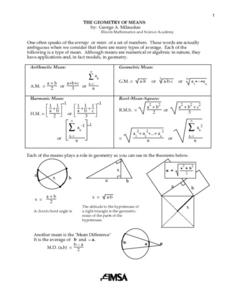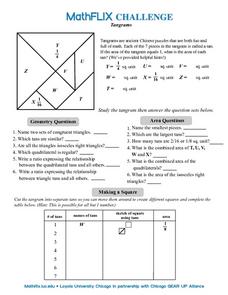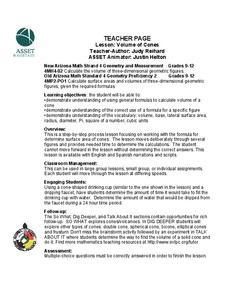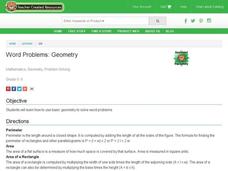EngageNY
End-of-Module Assessment Task — Precalculus (Module 1)
A transformational assessment determines how far pupils are advancing toward mastering complex and matrix standards. The assessment checks the learners' understanding of linear transformations, complex numbers and the complex plane,...
Curated OER
Measure Mania
Groups of students rotate through five classroom stations to estimate, measure, and record volume, length, weight, mass, and area using both customary and metric measure. They evaluate their data to determine how close their estimates...
Curated OER
Sweet Clara and the Freedom Quilt: The Real Story
Students learn how slaves communicated with each other. In this slavery and freedom instructional activity, students learn how slaves used quilts as maps, learn what different quilt patterns meant, draw a picture for their class freedom...
Curated OER
Area of Solids
Students find the area of rectangular solids and cylinders by cutting them into flat pieces and adding the areas.
Curated OER
Cube Models
Sixth graders are introduced to the concepts of area and volume. In groups, they work together to build models of square centimeters in which they are given no instructions. To end the lesson, they record the dimensions of each model...
Curated OER
Optional Laboratory: Calculating Board Footage in a Tree
Students work together to complete an experiment calculating the amount of board footage in a tree. They record their data and answer questions at the end of the lesson. They create their own hypothesis as well.
Curated OER
The Geometry of Means
For this geometry worksheet, students are given a rectangle and a square. They verify ratios when given equal perimeters or areas. Students are given adjacent squares. They find the distance between the centers, and identify the means...
Curated OER
Sudoku Puzzle: Logs and Exponentials
In this logarithms and exponential learning exercise, students solve 29 multiple choice problems. Students use their answers to solve a sudoku puzzle.
Virginia Department of Education
Order Up!
Order in the math class! Scholars learn to evaluate expressions using the order of operations. A game has them rolling number cubes to determine numbers to use when evaluating.
Alabama Learning Exchange
Polygon Perimeters
What are polygons? Learners find the perimeter of various geometric figures that the teacher has drawn in chalk on the sidewalk. A worksheet to record their measurements is provided. Get your third graders outside and exploring the world...
Pennsylvania Department of Education
Making Cubes
Third graders explore vocabulary associated with three dimensional figures. In this transformations activity, 3rd graders create two dimensional nets for three dimensional figures. Students become familiar with describing two and three...
Curated OER
Challenge: Into the Pool
On this area and perimeter worksheet, designers use a diagram of a Koi pool with its surrounding walkway surrounding and the appropriate mathematical formulas to solve a set of four word problems. An answer key follows the worksheet.
Pennsylvania Department of Education
Length and Perimeter
Third graders explore tessellations and the spatial concepts used in creating them. For this tessellations lesson, 3rd graders rotate, reflect and transform shapes to create tessellations. Students become familiar with the vocabulary...
Curated OER
Solve Word Problems with Geometry
In this geometry worksheet, students solve word problems having to do with lines, angles, shapes, area, perimeter, and more. Students complete 57 problems total.
Curated OER
Multiplying Polynomials
Students explore the concept of multiplying polynomials. In this multiplying polynomials lesson plan, students watch a video clip about basic math skills. Students work in groups on an exploration about why a binomial squared equals a...
Curated OER
Countdown Challenge: Tangrams
In this tangram worksheet, students find the area of each tangram shape. Afterwards, they name each piece and find the area of combined figures. This one-page worksheet contains approximately 25 problems.
Curated OER
Does Sunlight Effect Leaf Size?
Students make estimates and then measure leaves for accuracy. They calculate the area of the leaves by drawing an outline on graph paper and counting the squares. They compare the leaves exposed to sunlight to those that are in constant...
Curated OER
Volume of Cones
Students identify the volume of cones and pyramids. In this geometry lesson, students derive the formula for cones and pyramids. They calculate the volume of cones and other three dimensional shapes.
Curated OER
The Importance of Being Flexible and Open-minded as a Visitor to Another Culture: Lesson 2 For "The Train Ride Home"
Learners examine the advantages of being flexible when visiting or living in a different culture. They read and discuss a first-hand account by a Peace Corps volunteer in Kazakhstan, and write a letter from the point of view of a...
Curated OER
Sleuthing A Writer's Skills
Learners read The Train Ride Home by Robin Solomon. In this literature response lesson, students will inspect the writing of Solomon to determine how she established a certain tone through her word choice and paragraph structure....
Curated OER
Word Problems: Geometry
Students solve word problems by using basic geometry. In this geometry lesson, students use geometric formulas to find the perimeter, area, and volume of objects. Students complete a worksheet.
Curated OER
Volume
Students, after reviewing the measuring of the lengths of sides of different shapes along with the calculation of their perimeters and areas, encounter what it means by the 'perimeter' of a polygon. They practice measuring units of...
Curated OER
Integrated Algebra/Math A/B Regents Questions: Quadratic Word Problems
In this quadratic word problems learning exercise, students solve 8 short answer and multiple choice problems. Students write and solve quadratic equations given a quadratic word problem.
Curated OER
Pythagorean Theorem
In this finding the missing units in triangles worksheet, students apply the Pythagorean Theorem to solve. Students solve 10 problems.

























